|
|
|
Sort Order |
|
|
|
Items / Page
|
|
|
|
|
|
|
| Srl | Item |
| 1 |
ID:
160674
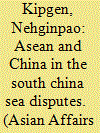

|
|
|
|
|
| Summary/Abstract |
The South China Sea disputes involve both island and maritime claims among sovereign states and the issue has long been a point of debate in international politics. It involves not only the countries in dispute but also other major world powers, including the United States. Its important strategic location and the abundant resources make the South China Sea a target of contention among the claimant countries. The arbitral ruling in July 2016 gives a new momentum to the dispute. The article examines the strategic relations of China and the Association of Southeast Asian Nations (ASEAN) by analyzing the positions and steps taken by ASEAN and China, as well as ASEAN-China joint initiatives. It also discusses the challenges and viable solutions to the dispute.
|
|
|
|
|
|
|
|
|
|
|
|
|
|
|
|
| 2 |
ID:
029998
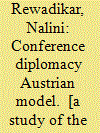

|
|
|
|
|
| Publication |
Meerut, Meenakshi Prakashan, 1973.
|
| Description |
212p.Hbk
|
|
|
|
|
|
|
|
|
|
|
|
Copies: C:1/I:0,R:0,Q:0
Circulation
| Accession# | Call# | Current Location | Status | Policy | Location |
| 011394 | 943.6053/REW 011394 | Main | On Shelf | General | |
|
|
|
|
| 3 |
ID:
096565
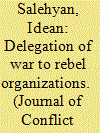

|
|
|
|
|
| Publication |
2010.
|
| Summary/Abstract |
States in an international dispute sometimes choose to attack their enemies with their own military forces but other times choose to empower domestic insurgent groups. What explains the decision to act through rebel proxies rather than directly engage a rival? Theories and empirical analyses of international conflict have adopted a state-centric bias, ignoring the substitution between direct uses of force and indirect action through rebel organizations. This note examines the decision to delegate conflict to rebels through the lens of principal-agent theory. While states support rebel groups to forgo some of the costs of conflict, they also lose a degree of foreign policy autonomy. Preliminary evidence of conflict delegation is presented, along with a number of empirically testable propositions. Finally, the consequences of delegation from the rebels' perspective are explored. This framework serves as a starting point for future research on rebel-patron interactions.
|
|
|
|
|
|
|
|
|
|
|
|
|
|
|
|
| 4 |
ID:
134152
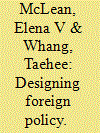

|
|
|
|
|
| Publication |
2014.
|
| Summary/Abstract |
The literature on economic sanctions has long studied sender countries' policymaking as a simple choice between imposing sanctions to extract concessions from the targeted country and doing nothing. We depart from this simplifying assumption and analyze sanctions as a multifaceted foreign policy instrument. We argue that senders design sanction policies in response to policy preferences of two domestic constituencies. Voters expect a response to an international dispute in the form of some policy, such as economic sanctions; hence, the sender's policymakers seek to demonstrate their competence in foreign affairs by imposing sanctions. Once the policymakers announce the use of sanctions, special interest groups that stand to experience economic losses when this foreign policy is implemented pressure the policymakers to choose sanction measures limiting such losses. As a result, the policymakers design sanction policies to include measures that will be less detrimental to special interest groups. We test our theoretical argument using the Threat and Imposition of Sanctions data and show that, while pressures from public opinion increase the likelihood of sanctions, special interest groups that benefit from the relationship with the target country are associated with a lower probability of the use of sanction measures that would impose substantial costs on domestic interest groups.
|
|
|
|
|
|
|
|
|
|
|
|
|
|
|
|
| 5 |
ID:
050919


|
|
|
| 6 |
ID:
131867
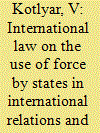

|
|
|
|
|
| Publication |
2014.
|
| Summary/Abstract |
IN ACCORDANCE WITH the UN Charter, a Bible of contemporary international law, all UN members "shall settle their international disputes by peaceful means" and "shall refrain in their international relations from the threat or use of force" (Article 2, Paragraphs 3-4). The Charter allows, in the form of an exception to this general rule, states to use force in only two cases - as self-defense against an armed attack from the outside (Article 51) and, following a UN Security Council (UNSC) decision, to remove a threat to the peace, breach of the peace, or act of aggression (Articles 39-42).
|
|
|
|
|
|
|
|
|
|
|
|
|
|
|
|
| 7 |
ID:
123717
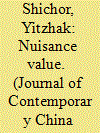

|
|
|
|
|
| Publication |
2013.
|
| Summary/Abstract |
While a small number of Uyghur communities had begun to settle in Germany already in the 1950s and 1960s, since the 1990s they have chosen Munich as their center of national and political activism in Europe and worldwide. By that time the Chinese had begun to apply pressure on the German government to restrict Uyghur activities and to monitor and intimidate them and their German supporters, also by using spies and collaborators. As a democratic country Germany rejected the Chinese demands, although refusing to admit former Uyghur Guantanamo inmates. Despite occasional tension, Sino-German relations have not been affected by the presence of Uyghurs, some of them labeled as 'terrorists' by Beijing. My conclusion is that the Uyghur 'threat' has been deliberately inflated by China as a tool in its relations with other governments and that economic relations and technology import are far too important to spoil by persecuting Uyghurs.
|
|
|
|
|
|
|
|
|
|
|
|
|
|
|
|
| 8 |
ID:
102298
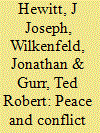

|
|
|
|
|
| Publication |
Boulder, Paradigm Publishers, 2010.
|
| Description |
iv, 156p.
|
| Standard Number |
9781594517150, hbk
|
|
|
|
|
|
|
|
|
|
|
|
Copies: C:1/I:0,R:0,Q:0
Circulation
| Accession# | Call# | Current Location | Status | Policy | Location |
| 055780 | 303.6/HEW 055780 | Main | On Shelf | General | |
|
|
|
|
| 9 |
ID:
133952
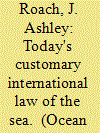

|
|
|
|
|
| Publication |
2014.
|
| Summary/Abstract |
International courts and tribunals, governments, and scholars over the past half-century (many in the past two decades) have identified various provisions of the 1958 and 1982 treaties on the law of the sea that are customary international law and thus binding on all states, including those not party to these treaties. This article systematically collects these opinions and identifies provisions that have not yet attracted their attention
|
|
|
|
|
|
|
|
|
|
|
|
|
|
|
|
| 10 |
ID:
133277
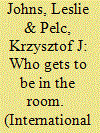

|
|
|
|
|
| Publication |
2014.
|
| Summary/Abstract |
Third parties complicate World Trade Organization (WTO) dispute settlement by adding voices and issues to a dispute. However, complainants can limit third parties by filing cases under Article XXIII of the General Agreement on Tariffs and Trade (GATT), rather than Article XXII. We argue that third parties create "insurance" by lowering the benefit of winning and the cost of losing a dispute. We construct a formal model in which third parties make settlement less likely. The weaker the complainant's case, the more likely the complainant is to promote third party participation and to settle. Article XXII cases are therefore more likely to settle, controlling for the realized number of third parties, and a complainant who files under Article XXIII is more likely to win a ruling and less likely to see that ruling appealed by the defendant. We provide empirical support using WTO disputes from 1995 to 2011.
|
|
|
|
|
|
|
|
|
|
|
|
|
|
|
|
|
|
|
|
|